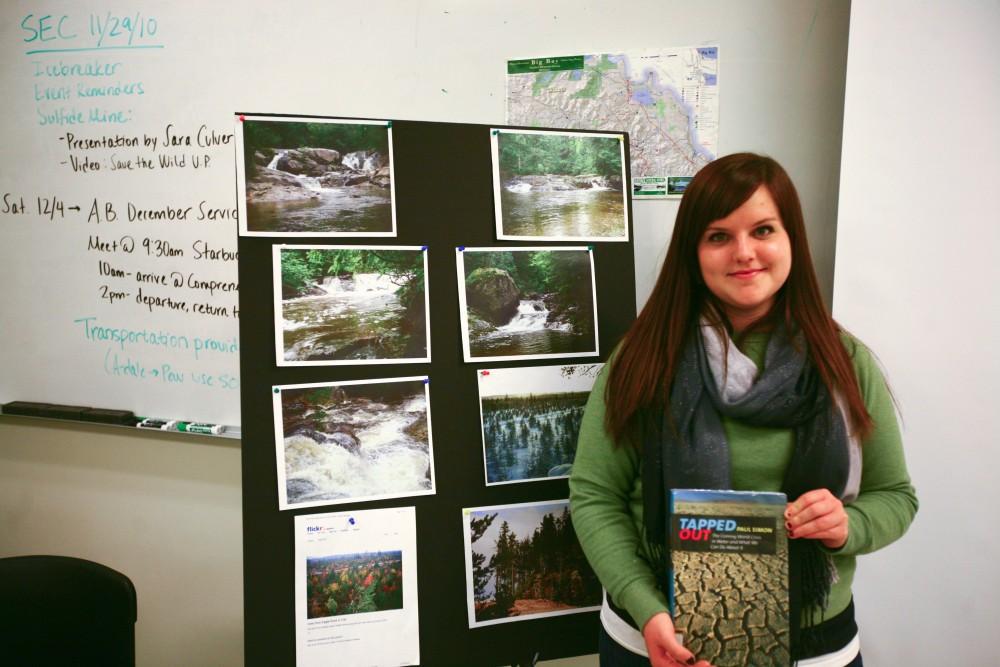Student Environmental Coalition fights to ‘Save the Wild U.P.’

Katie Sexton, president of the Student Environmental Coalition, poses for a photograph at “Save the Wild Up” hosted by the SEC
Dec 6, 2010
Bounded by three of the five great lakes as well as the St. Mary’s river, the Upper Peninsula of Michigan is most frequently noted for its abundance of wilderness and wildlife.
The stillness and sanctuary “above the bridge” is rivaled only by the looming threat of ecological destruction due to the increasing trend of sulfide mining not only in the UP, but across the entire Lake Superior basin.
President of Grand Valley State University’s Student Environmental Coalition (SEC), Katie Sexton, is hoping to help the U.P.‘s modest man power in the process of gaining momentum, educating and informing Michigan’s students about the metallic sulfide mining process.
“People in the UP lack the numbers to create a strong political opposition to this mine, and this organization is a way of getting other Michiganders, environmentalists, and people concerned with the basic human right to fresh, clean water concerned about the threats that these mining projects pose,” Sexton said.
At an event hosted by the SEC on Nov. 30, guest speaker Sara Culvers of the citizen-based organization Save the Wild U.P. held a video showing and discussion on the dangers of metallic sulfide mining, which can introduce contamination to Lake Superior that will take 190 years to cycle through.
“Our Great Lakes make up at least 18% of the planet’s fresh water,” Culvers said. “We are losing fresh water at a dizzying pace and in the words of a Marquette physician, ‘You’re rolling the dice if you put a mine next to this lake.’”
GVSU junior and ‘Yooper’ Kelsey Mackie heard Culvers speak and said that although she called the wilderness above her home, she never realized the importance of it until now.
“Growing up in the Upper Peninsula, I took living on the shore of Lake Superior and having the opportunity to explore the surrounding wilderness for granted,” she said. “But after learning about the sulfide mines endangering the ecosystem of my home, I was actually outraged.”
Currently, the Save the U.P. anti-sulfide mining efforts have zeroed in on Kennecott Minerals – a wholly-owned subsidiary of world mining giants Rio Tinto – that Sexton said has a history of poor mine structure that often leads to severe water pollution and damage to surrounding ecosystems.
The metallic sulfide mining process extracts valuable metals like gold, nickel and copper from a sulfide ore body of which are prevalent along the 1,700 miles of U.P. shoreline. Extraction of the metals releases sulfur that when oxidized (mixed with water and oxygen) produces fragrant sulfuric acid that turns streams orange, kills plants and wildlife and is long term and irreversible.
In pursuit of the sulfide rock ore -which contains several billions of dollars worth of nickel – Kennecott is pushing to begin mining under the Salmon Trout River with the mine’s entrance site at Eagle Rock – a sacred site of worship to the native Ojibwa tribe, who make up a substantial portion of the population along the Keweenaw Peninsula.
“Blowing up Eagle Rock for mining is the same thing as blowing up a church to them,” Sexton said.
Aside from potential sacrilege and water contamination, Culvers said that all plants and animals species in the area will be drastically and adversely impacted by the metallic sulfide mine, including the endangered Brook Trout.
“If this goes through, my grandchildren will not have the joy of seeing their grandchildren frolicking on the clean beaches of Lake Superior or splashing in the Yellow Dog River any more than we can enjoy the waters of the Grand River,” she said.
Although Kennecott received permits from state agencies to begin mining in Michigan under Michigan’s sulfide mining regulations – which the Save the Wild U.P. website maintains are “weak and untested” – the permits are currently being contested by the Keweenaw Bay Indian Community, Huron Mountain Club, Yellow Dog Watershed Preserve, and the National Wildlife Federation.
It’s not just Kennecott who has big plans, either. Culvers said that a number of other big ticket mining companies are in the process of detailing plans in hopes to turn the U.P. into a comprehensive “mining district” that would stretch from the far eastern tip of Minnesota, passing through Wisconsin and the center of the U.P. and continue on down under the waters of Lake Michigan.
“If these mines are built, the entire U.P. will be another Appalachia: ruined land, poisoned waters, and an impoverished society,” Culvers said.
To combat criticism, the network of mining agencies is emphasizing job creation in the face of an exhausted economy. Culvers said that because “no politician wants to seem anti-job,” big business sulfide mining is receiving growing support from a number of politicians and representatives.
The most effective way to fight back, Sexton said, is by “getting a critical mass of concerned citizens to influence decisions made by legislators, officials, and ultimately those individuals who will be making the decisions about the mine and its operating procedures,” or more simply put – political lobbying.
By writing into state legislators as well as the Michigan Department of Natural Resources and Environment, the U.S. Environmental Protection Agency and US Department of Natural Resources, college students can be pivotal in influencing future legislation.
“College students have the educational resources and ability to cause a shift in the mining trend. It is important that we fulfill these responsibilities,” Sexton said. “And with the growing human population and diminishing sources of freshwater, accelerating the water crisis is something that has the potential to become very real to them later in life.” [email protected]























